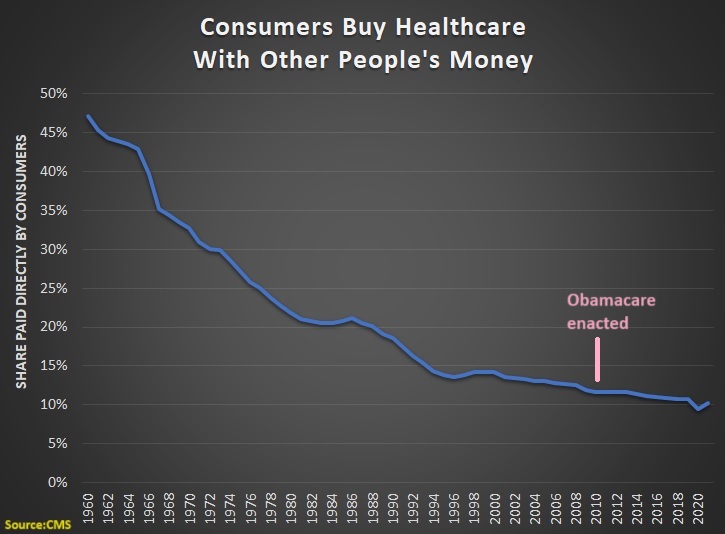I periodically use “Least Surprising Headline” to call attention to articles citing very predictable outcomes.
- Pandemic spending being a magnet for fraud.
- European politicians finding another excuse to expand government.
- Bailouts not solving problems.
- Cost overruns on government infrastructure.
I’m going to add to that list today, but first let’s refresh our understanding of how government-caused “third-party payer” makes America’s health care system very expensive and inefficient.
The key insight is that consumers have little incentive to be smart shoppers when they perceive that other people are paying the bill. And health providers, needless to say, have little incentive to control costs when they know consumers care very little about prices.
Is this a big problem?
No, it is not a big problem. It is a giant problem. Here’s a chart, based on the federal government’s data, showing the share of health expenditures that are paid directly by consumers.

In the chart, I show the year that Obamacare was enacted. Notice that the legislation didn’t have an effect on the trendline, either the year it was enacted or in subsequent years as it was implemented.
And since Obamacare didn’t reduce the problem of third-party payer, one might guess that it didn’t solve the problem of rising health expenditures.
That guess would be correct, as shown in this column by Megan McArdle, which includes a predictably unsurprising headline.
…in 2022, the United States spent 16.6 percent of its gross domestic product on health care, while the next-highest spender, Germany, spent only 12.7 percent… As the Affordable Care Act took shape almost 15 years ago, its architects started looking for…savings… All these years later, we still haven’t found the magic money pot. …Obamacare contained a lot of elements that were expected to realize significant cost savings while actually improving the quality of care. …What this demonstrates is how hard it is to actually change the system in ways that generate major savings. …the wonks hunting for magic pots of money have mostly turned out to be chasing rainbows.
I could pat myself on the back for predicting back in 2009 that Obamacare would be a fiscal mistake.
But that would be like congratulating myself for predicting it gets dark at night.
P.S. Repealing Obamacare would be a good step, but it’s just one of many changes that are needed to enable a market-based health system.


